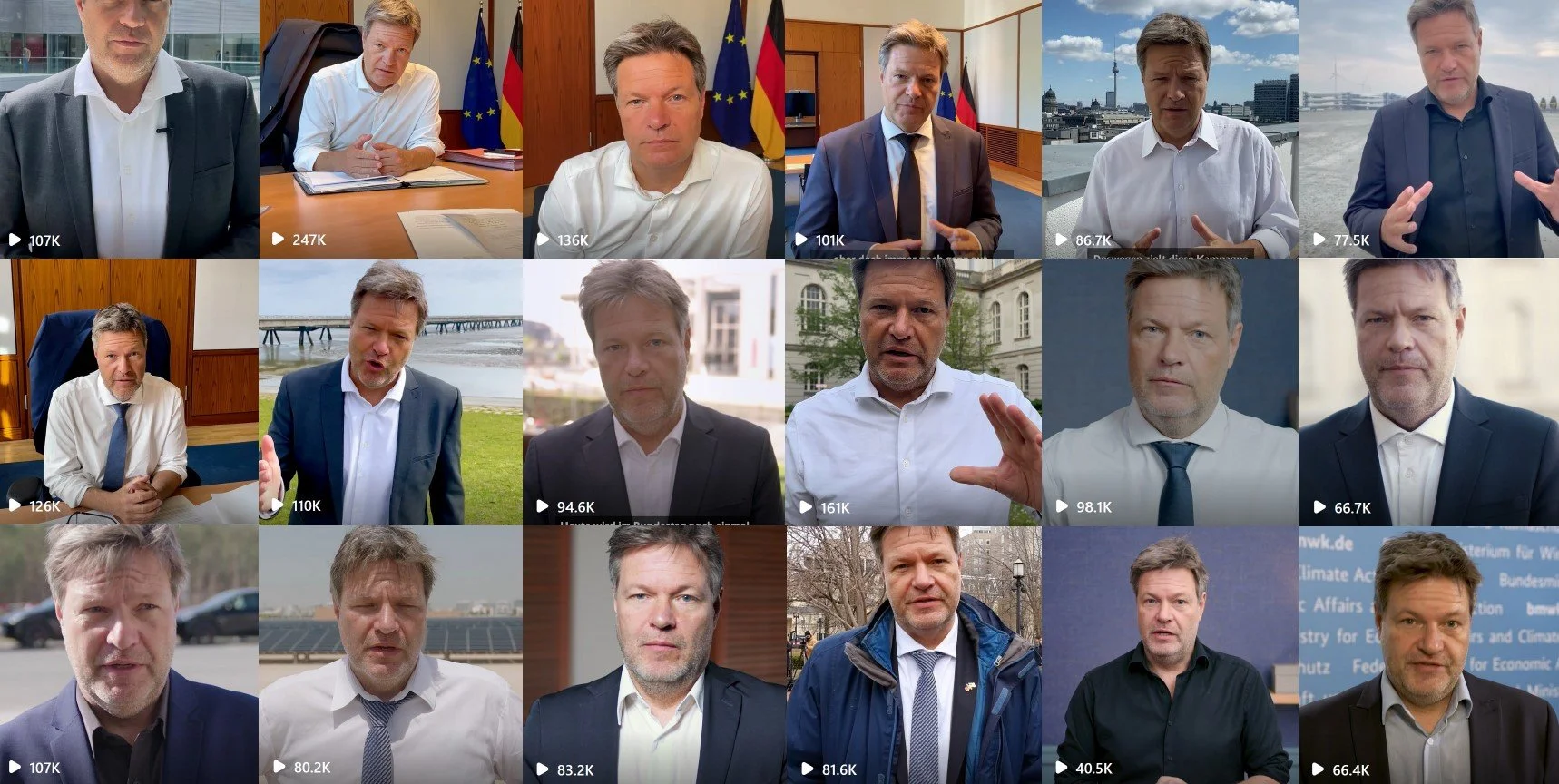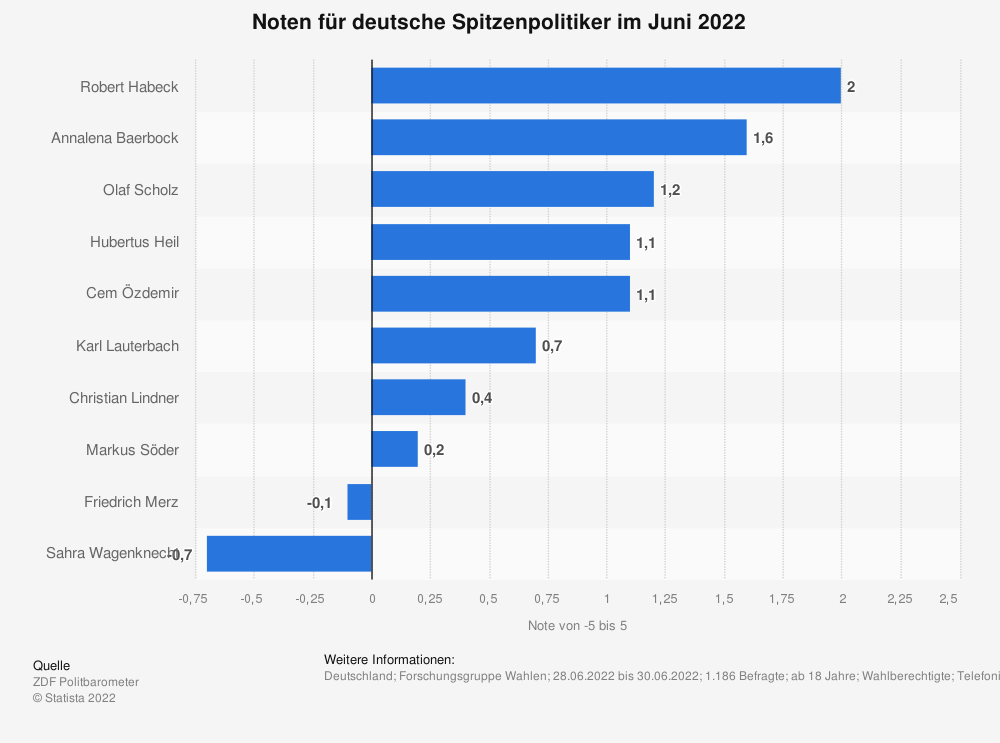Robert Habeck is here to bear the bad news - and is reaping the political benefits of doing so.
The Vice Chancellor and Minister for Economic Affairs and Climate Action has developed a social-media strategy that speaks to German sensibilities and setting new standards for political communication in the process.
Michael Grubb
Berlin 11.07.22
In December 2021 a documentary was published on German public television that followed Robert Habeck, co-head of the German Green Party during and after the federal election campaign that ended the previous September. The outcome of that election left his party as kingmaker in the coalition negotiations that followed, and with he himself as Minister of Economic Affairs and Climate Action and Vice Chancellor. The film intimately follows Habeck and contains an extraordinary scene that seems to confound the traditional barriers built by German politicians between their public personas and personal realities.
The scene takes place during the time when the outlines of the new government were being drawn through negotiation. It is the end of a long day and Habeck, visibly exhausted, is standing in front of his apartment Building in Berlin as he begins an exchange with Markus Feldkrichen, the public television journalist who produced the film. The subject is the personal toll the election has taken. “I don’t know what I am doing tomorrow. I don’t know what I am doing Friday. Five days ago I did laundry – it’s still lying in the hallway. I haven’t done the dishes in ten days. The trash hasn’t been taken out. There’s no more milk. This morning I ate granola with water, no joke. I didn’t have any milk, or oat milk. Absolutely nothing,” he said. Feldkirchen asks if his wife is around. “No, she doesn’t want to watch me sink like this. We haven’t seen each other in a long time,” Habeck replies.
In this instance Habeck, once dubbed the “philosopher” of the Green party, a principled and skilled orator who has reliably set the party’s moral compass, broke the fourth wall of political theater in a way that now, in retrospect, seems to foreshadow the strategic communication he would bring to the fore as he settled into his seat of power in the following months.
In a world where crises seem to be multiplying and their impact compounding, Habeck has become Germany’s most effective communicator of difficult realities; one could call him everyone’s preferred bearer of bad news. Faced with stagnating economic growth, inflation that threatens to upend decades of middle-class German consumption and prosperity, and a conflict-driven energy crisis that threatens the viability of German industry and the simple ability to heat our homes in the coming winter, the Mister of Economic Affairs has taken center stage in attempting to assuage a palpably anxious public.
Except that Habeck has seldom taken to the stage in order to communicate how his ministry and the federal government intend to address these issues. Instead, he has taken to social media. The Minister of Economic Affairs and Climate Action has begun to instrumentalize Twitter, Facebook, Instagram and co. - using these platforms as a means to communicate directly to the public in a way the effectively combines his sympathetic public image with a political strategy that recognizes the importance of communicating difficult political decisions clearly and at eye-level with the voting public. In doing so he is upending the established notions of the appropriate rhetorical distance between decision makers and the public in German politics, and setting new standards in the process.
-
On June 23 a video was posted on both the official twitter account of the Federal Ministry for Economic Affairs and Climate Action and on Robert Habeck’s personal Instagram account. In it the Minister is positioned close-up in a vertically oriented frame. The stained-wood paneled walls, typical interior decor of German government buildings, provide a contrasting background, with the German and EU flags in view behind.
This was the day the government had made the decision to declare “Gas Alarm Level II”, a set of contingency plans that had been established to go into effect in the event of a major disruption of natural gas supplies to Germany. Deteriorating relations with Russia in the context of its continuing war of aggression in Ukraine had led to a substantial reduction of the amount of gas it sends through pipelines to Germany. Subsequently, it had become unavoidable that Germany must seriously confront the consequences of a dependency on Russian gas that had been built over the decades since re-unification in the 1990s.
The “Gas Alarm Level” plans are, in a word, complicated. And they carry with them real consequences for individual households and industry alike – at the terminal end it would determine the implementation of rationing of energy resources.
Habeck none the less takes to Instagram and Twitter to explain the context for why the decision was made (the rate at which gas deliveries have been reduced and what that means for the State’s ability to fill reserve reservoirs that would otherwise ensure that enough gas is available through the winter) and the tough consequences this new reality brings with it.
He presents the facts of the matter in a manner that recalls a college professor speaking to a small intimate seminar. The audience should feel reassured that decisions are being made on the basis of a thorough, deliberative process: “We have run through all the hypothetical models of how this could play out…” But we also, in his view, need to be informed of the hardship that may be waiting for us on the horizon: “We are experiencing a warm summer now. Nobody is running their heaters and people want to be left alone. They don’t want to have their ears talked off about politics. But a warm summer shouldn’t deceive us – winter is coming.”
The difficult political contractions that this situation imposes upon him personally are also frankly acknowledged. Habeck, who as a member of the Green Party has environmental stewardship and the fight against climate change firmly at the fundament of his political world-view, must announce that this scenario has forced him to approve the re-starting of coal-fired power plants that had been previously taken offline. “It is a measure that is calamitous, but necessary,” Harbeck says. “Coal has a carbon emission level that is worse than gas. It is worse for the atmosphere. The decision that I made as Minister for Climate Action is worse for the atmosphere. One simply has to admit that, there is no way around it.”
This approach of breaking down complicated issues in a clear and concise way, accompanied with a frank acknowledgment of the present contradictions and the difficult political decisions they have forced upon the government are characteristic of all of the videos Habeck has produced in this mode. 22 in total since February 1 this year.
-
According to Jost Listemann, a lecturer in Visual Communication at the University of Applied Sciences in Berlin, the approach speaks to an understanding on the part of the Minister of a particular set of German sensibilities. “In the end it is very close to our identity. It is very German what he is doing.” Listemann points out that Germans have tended to value politicians that exude an air of reasoned, thorough, and deliberative decision making. Germans are more concerned that their politicians provide experience and stability over an exciting personality.
The example par excellence is of course Angela Merkel, who’s stoic, thoughtful public persona left most feeling reassured that she had taken all sides of any given issue into consideration. These are also the characteristics that arguably propelled Olaf Scholz to the Chancellery. In the past he has been dubbed the “Scholz-o-mat” or “Scholz machine” – a reference to the somewhat robotic way he seems to be able to remain on message.
In the past, governance conducted by stable, qualified, and boring German politicians could effectively take place behind closed doors. Germans were satisfied with the insinuation of an inwardly oriented deliberative decision-making process, announced to the public in speeches on the floor of the Bundestag or in press conferences, and subsequently explained to the public through the media. However, in the current world of compounding international crises, the need to clearly explain the decision-making process to the public has become a trap for some and a transcended opportunity for others.
The public image of Chancellor Olaf Scholz has taken a beating in recent months as he has struggled to communicate the government’s position on issues such as material support for Ukraine in its fight against Russia. Scholz’s robotic, often monosyllabic communicative approach, which had endeared him to many in the past, has become an impediment.
It has left a void that the Minister of Economic Affairs has slipped into. “Robert Habeck has been able to translate the deliberative process [of government decision making] into a communication strategy that takes the German people seriously,” Listemann said. In the face all the current crises (war, inflation, energy, corona, the climate crisis), Habeck’s strategy looks Germans in the eye, as if to say, I see what’s going on, I know how concerning it all is, we have tough decisions to make, allow me to explain how we came to our conclusions. He (for better or worse) isn’t leaving it up to journalists to explain he process to the public, but rather is using the modalities of social media to circumvent the gatekeepers.
He and his party are being rewarded for it. According to recent polling conducted by German public broadcaster ZDF, he has the highest approval rating of any national politician in Germany, followed closely by the Foreign Minister Annalena Baerebock, who herself has challenged the traditional molds of German foreign policy and maintains an active, personalized social media presence. Their Green Party has also notched recent success at the state level, having been able to form new coalition governments in the states of North-Rhine Westphalia and Schleswig Holstein in the past two months.
These factors would seem to indicate that the winds of political communication in Germany have shifted. In a world where stability seems to be a thing of the past, and where the locus mass communication has shifted to the arena of social media, German politicians who wish to win over the public would do well to follow Mr. Habeck’s example.
**This piece was produced as part of the coursework in the MA in Digital Journalism at the HMKW Berlin.

